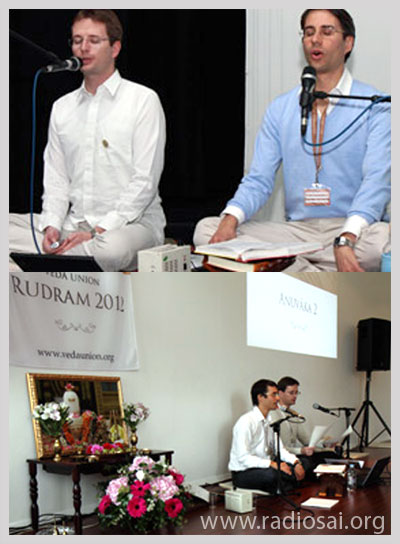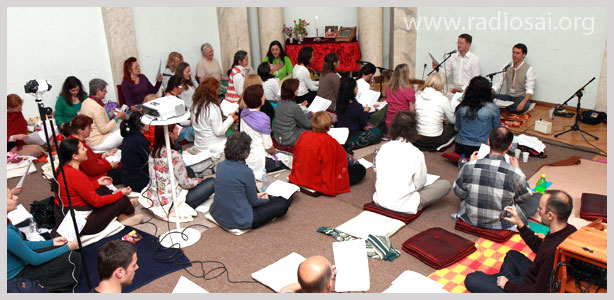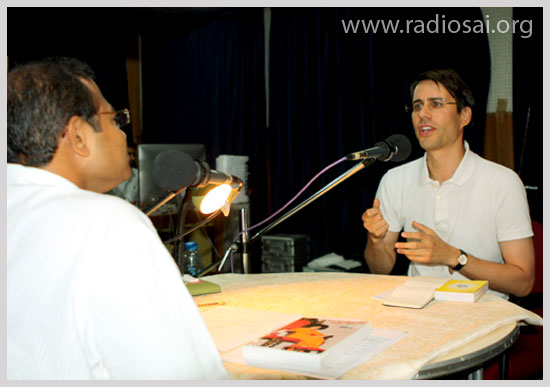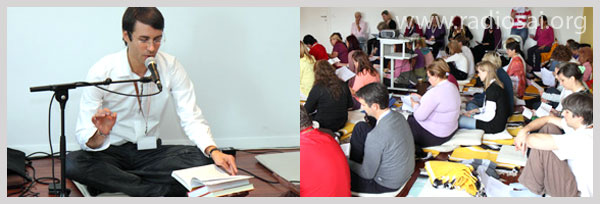|
|
| 'Like' us on Facebook | Follow us: |
Posted on : Sept 28, 2012
UNITING EUROPE THROUGH THE VEDAS
- An exclusive conversation with Mr. Vajko Kerchen, Slovenia
part 02
Listen to the audio
Veda Chanting is a Feast to the Spiritually Starved
So, let me ask you something else? Now, when we are talking about Vedas and spreading the message of the Vedas, apart from the challenge that you face in chanting these mantrams, do you also face other questions like - Why Vedam? Why you are engaged in something which has to do with Hindu culture? Why are you forcing Veda on us? And so on.
Vajko: Personally, I’ve seen very few instances like this. There might be other people there who may talk like this. However, first of all, the need is so great, not only in our country or Europe, but everywhere else in the world; people are so hungry about spiritual knowledge that they would take anything, from yoga, meditation and chanting, to other spiritual practices. Our country is booming with spiritual groups.
RS: Because for so long people were so much hungering for something like this and during the communist regime, it was always difficult when it came to spirituality and religion.
Vajko: Yeah, people are just hungry. So, I meet with zero resistance when working on this.
RS: Wonderful!
Vajko: There are also the different questions on why we are doing this. There’s also a question on why we shouldn’t do it? One might approach Vedas first through Hinduism, but studying more of the Vedas, you see this is not even a religion, it is a way of life. It is a way to teach you how to be human and be actually divine.
RS: It is just knowledge.
Vajko: Yes.
 |
|
| Mr. Branimir Gonan and Mr. Vajko Kerchen, founders of the Veda Union |
RS: I remember, there was one occasion when somebody questioned like this, and Swami said that just because Newton discovered the gravitational force, you can’t say that the gravitational force belongs to England because Newton belonged to England.
Vajko: True.
RS: Swami said, the Vedas are there from times immemorial, it is just that the Indian sages understood it, grasped it, codified it and communicated it. The Vedas are there for all to learn and benefit from.
In another discourse Swami mentioned, how Vedas are so important for the propagation of right conduct or dharma, Baba said, “Vedokhilo dharma moolam” which means, if you want to protect dharma, that is righteousness, you have to protect Vedas because in Vedas, there are these codes of conduct about right living and if you don’t protect the Vedas, you are actually sabotaging righteousness in the world.
And in another discourse in 1987, Swami very emphatically said that one should be fearless while talking about Vedas, one should be confident because there is so much need for this in today’s times. I do not really know if you have heard Swami talk about all this but it is so heartening that you and your Sai brother have been so passionately engaged in this mission.
Vajko: I understood that certain qualities develop in you over the years as you chant Vedas. Only later I found this out.
RS: Can you give some examples?
Vajko: The relationship with your fellow beings, your family and learning to follow simple life style. In the Taithireeya Upanishad there are beautiful quotations on food - do not throw food, respect food and grow food - and all these simple things of life. These qualities just develop in you.
RS: Fantastic! There is so much, I think, especially in the area of the relationship between man and man, man and Nature and Nature and God.
Vajko: Correct.
RS: I think this entire spectrum is so beautifully inherent in the Vedas. You take any mantram and you will find these things.
Vajko: Correct, correct.
RS: I remember Swami saying on another occasion, that the most important thing about Vedas is the knowledge of unity – that divinity pervades everything. And it is just one principle, that atmic principle which we call advaita.
So this unifying factor of divinity is contained in the Vedas and as you said, as you dig deeper and deeper this knowledge comes to you and then, automatically you feel one with creation.
Vajko: Absolutely.
The Lessons and Experience Accrued
RS: Beautiful! So tell us how has this experience of travelling to different countries, spending so much time and energy has been? Were there times when you really felt that, 'Oh, this is so difficult, I don’t know if I can manage. Swami, please help me!' `
 |
  |
 |
 |
 |
 |
 |
| Sri Rudram 11th Anuvaka workshop, Novi Sad, Serbia, 31 March 2012 | ||||||
Vajko: Well, not really, but professionally I am very busy, I work in a software company.
RS: Yeah, I understand that, that is why I asked you.
Vajko: I spend most of my time involved in the Vedas; it’s challenging and evolving. This, you notice the day after the workshops. They are so concentrated because to chant six hours with one focus in mind, takes so much effort and then the next day you feel the changes, you feel the energy, you feel very much blessed to be able to do that.
So, yeah, it is a lot of work, but how we organize is that every local group in their own city or country conducts these workshops. Branimir and I just help, give our guidance and support but the local groups are responsible for choosing the venue and making the arrangements.
RS: So, if it happens in Croatia, the local devotees in Croatia will do everything.
Vajko: Correct. So this is how we organise and it is working.
RS: I saw the videos and the choice of the venue also is so good!
Vajko: [laughs] Every time, everything goes off very well.
RS: [laughs] So, you must be feeling Swami’s presence in so many ways whenever you organise it. Were there times where you really felt His presence very strongly?
Vajko: Whenever we chant, it’s 100 people chanting these mantras together and we feel it in our hearts. So that’s the biggest presence, which I can feel when so many wonderful people chant this. I feel the presence of God, Swami and myself in my heart, and then I know I’m doing the right thing.
 |
|
| Sri Rudram 8th Anuvaka workshop, Budapest, Hungary, 16 April 2011; Mr Vajko and Mr. Branimir Gonan conducting the classes |
RS: Personally, what kind of impact has it had on your personality, in the way of life, in the way you look at life, after you started getting more and more involved in the Vedas and becoming stauncher devotee of Bhagawan and loving Him more and more?
Vajko: One of the things which I somehow learnt a couple of years ago is that, basically there are no differences in whatever I do. Whether I do my office work, my Veda work or other work, my mind should be the same; it should be fully involved and concentrated in what I am doing.
RS: The virtue of concentration.
Vajko: Yes, concentration, doing everything from the heart and with depth. It’s better not to do things that are on the surface. So, in all these years, things have just fallen off me, meaning, from my mind, from my obligations. I have only a couple of obligations and if I follow them with my full concentration, everything will be fine.
RS: Beautiful. So, you have come to a way of life where you don’t really distinguish between different kinds of work, be it be your office work or Veda work or your personal work.
Vajko: Yes, I really don’t. If I have to write an e-mail for Veda chanting or for my office, I have the same attitude. It should be correct, it should be to the point and it should be from the heart. So, it really doesn’t matter anymore.
RS: So, you are living with the understanding that God pervades everything. Everything has to be done perfectly.
Vajko: I try to do that.
RS: That is what Swami has been saying all the time. Often people get into a boxed mindset, so they put on the spiritual cloak and sit for bhajans and do seva but once they go to their workplace, they say 'this is a practical world, I cannot make spirituality work here.'
But Swami always wants us to seamlessly integrate spirituality into every facet of our life. He said, for example, if you are rolling chappattis, know that you are flattening your ego, or if you are cutting vegetables, think you are slicing your desires, and so on.
 |
|
| Mr. Vajko in the Studios of Radio Sai, August 2012 |
So these are the kind of things that Swami always told us because He gave us that beautiful cosmic relationship and connection, that man is a limb of society, society is a limb of Nature and Nature is a limb of God. So, ultimately, everything is divine. And that perspective is what is there in the Vedas and you are now able to somehow see that and live in that feeling. That is fantastic. I think you must be sharing these insights with your fellow devotees, who are learning Vedam?
Vajko: Yeah. I personally teach twice a week at my home, sometimes even thrice, it depends. We talk about these things; through the Vedas we try to imbibe the teachings, we meet, and yes we share our experiences.
RS: How has their experience been? Have any of them shared with you how they felt after they got involved with this Veda Union project?
Vajko: Yeah, sure. Most of them are Sai devotees already. So this is just a continuation of their spiritual practices, if I may say. But the newcomers come and share their experiences. You know, just listening to these sacred chants calms your mind and fills it with concentration and motivation for other spiritual practices. So it’s quite evolving, I must say this.
RS: So people definitely must be sharing their stories of how it has benefitted them and that would be another inspiration to carry on this project.
Vajko: Yes, that’s true. That is an inspiration.
RS: Wonderful. As we were talking about these vibrations, I was reminded of a conversation I had with Mr. Sai Surendranath, a very senior member of the Prasanthi Bhajan group.
And he was sharing how, many years ago, Swami, one day told all the boys, who were sitting jam-packed in front of Him in Trayee Brindavan, “Boys, you should not sit like this where you are touching each other so much. It is ok, when you are sitting in front of Me, but else where you should not touch each other so much, because each boy has different vibration and these will really get into each other. So, try to avoid physical contact as much as possible.”
At that point nobody really understood much of what Bhagawan said. And then a few days later, Mr. Frank Baranowski came. He is the man who has the gift to see auras or radiations, emanating from every being and everything. For example, if it is a mother and a child, he saw that a blue or a pink aura of love, enveloping the mother and the child. And if there are two people fighting he saw the colour of aura change to red, and so on.
And one day, sometime in the 70s, when the nagarsankirthan was on in the Brindavan ashram, Swami came out and Mr. Sai Surendranath was there and when Frank saw Bhagawan coming out, he simply shouted because, as he explained later, 'I have never seen anything like this. This aura is so deep and it is white and blue and then pink; pink is the ultimate colour of pure love and it is just extending beyond, I don’t see where it ends, I have never seen a person who gives out so much continuously.'
(H2H Archives: You may want to read the Cover Story - RAYEE: THE GIFT OF DIVINE INTIMACY)
 |
|
| Mr Vajko teaching the Rudram during 2nd - 4th Anuvaka Workshop, Ljubljana, Slovenia, 2 October 2010 |
He was saying that when Swami is giving darshan, or when He is talking to someone, this light from Bhagavan is completely suffusing the other person.
Only when the boys heard this, they realised the importance of what Swami said of vibration and radiation.
How powerful is this! When we sing bhajans together or chant Vedam together, we really do not know the impact that we are causing to the world, to ourselves and to our surroundings.
Vajko: Absolutely.
RS: Many a times even if God asks us to do something, our stupid mind gets convinced only after someone explains that to us scientifically.
The Road Ahead for the Veda Union
So it is really beautiful that this mission is trying to unite Europe through these positive vibrations. So what is your next project now?
Vajko: We have completed the Rudram 2012 project having spent two years on that. Now it’s the Chamakam and I believe we may spend a year-and-a-half learning it.
RS: So again you are going to different corners of Europe to teach chamakam?
Vajko: Again, we will follow the same organisational structure. We will divide certain anuvakas and I think it may take three or maybe a maximum of four different workshops around Europe but at least for now, our short term goal is to learn complete namakam and chamakam, so that, we are able at a certain point to come together from different cities around Europe and chant namakam 11 times and chamakam once.
This is the goal towards which we are heading. We prepared two years for namakam, now comes chamakam and after that we hope to organise different workshops around Europe where 100 to 150 people can come together and chant these 11 times. Of course, we have to practice more; try to find people who will be able to lead because the two of us cannot do this alone. So what we will do is divide ourselves into two groups, so that every group chants a line. So, it’s a big process to go through to get there.
RS: And earlier you were mentioning that you want to come to Puttaparthi also as a group.
Vajko: Yes. As a matter of fact, there is now the plan - to come for Dasara this year.
RS: Dasara, this year? Wonderful!
Vajko: Just to pray to Bhagawan to let us continue this work so that we can start chamakam after Dasara.
RS: Wonderful, Dasara is the time when many years ago, Swami started the Veda Purusha Saptha Jnana Yajna.
(H2H Archives: You may want to read the related articles - YAGNOTSAVA & THE TRUE SPIRIT OF DASARA)
Vajko: That’s right.
 |
 |
 |
 |
 |
 |
 |
 |
RS: From, then on, it has always continued. Swami has never stopped this Vedic sacrifice during Dasara. I remember in the earlier years, Swami started the Veda Pathashala in Prasanthi Nilayam when we had few students who learnt only Vedic hymns. But later once the University came into being, Swami had the pathashala closed because the whole thing now acquired such a big proportion; all the boys now chant Vedas.
Of course, the major thrust came in 2004 as we were talking before when Swami wanted Vedam to be chanted during darshan sessions, in the mornings and evenings. So it has now become a regular routine of Prasanthi Nilayam. So it is really wonderful that in some ways this message is going out and in such a wonderful way it is happening in Europe and Swami has blessed you to be an instrument for this. Anything else you would like to share to our listeners?
Vajko: I would encourage anybody who is inclined towards doing this practice, towards this chanting. I want to say to them - 'It might be hard in the beginning but with devotion, sincerity and with prayers you will definitely succeed.' There are people who come to me and say it’s very difficult but I want to do it.
So you just have to approach it slowly and pray. If you pray things will be answered, that is for sure.
RS: Fantastic. It was wonderful to have you in the studios of Radio Sai and share with us this journey with the Vedas and I hope when you come during Dasara we will probably meet again.
Vajko: Sure.
RS: Thank you so much.
Vajko: Thank you. Sairam.
Photo Courtesy: vedaunion.org
- Radio Sai Team






